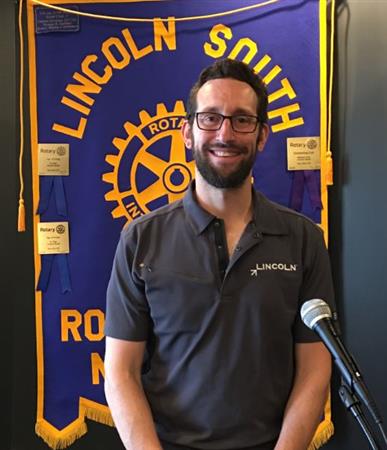It was a pleasure to hear from Bryan Seck, the Director of Workforce Development for the Lincoln Partnership for Economic Development at our meeting on June 7.
Bryan was part of Prosper Lincoln which designed a plan to improve our community. The plan for Prosper Lincoln came from Vital Signs studies. The focus of Prosper Lincoln continues to address the needs. Some changes are yet to be put in place.
Bryan shared facts and figures but, more importantly, shared stories. He said that we may not have noticed a rise in the unemployment rates with the recession. But, what happened is that many jobs weren't lost - they were just changed from full time to part time. What that did was increase the underemployed population. But, there is not a way to measure that.
Instead we saw an increase in the number of families at poverty level - many due to becoming underemployed.
"In our community, the average person in poverty is a single, white mom with at least one job and with two school-aged children.""
Brad shared a budget for a mom with three kids.
$1,664 - Income er month ($13/hour, 32 hours/week)
$1,660 - expenses (rent, car, phone, utilities, diapers/toiletries, childcare, gas, auto insurance)
$4 - remaining for savings
At about $2,000, they qualify for food stamps which helps cover about $200 per month. We discussed what happens when she is offered a pay increase that will net another $150 per month. But, it would then put her over the income level and she would lose her food stamps (so basically loses $50 per month).
If she declines the raise the employer may think she is lazy, or wants to depend "on the system". We need to find a way to make the salary increase worth accepting.
Bryan spent some time discussing a way that we can help move people out of underemployment - away from poverty - and possibly help them survive without being dependent on support of food stamps and other government assistance.
Key - help them see a career path. Rather than looking at the job as a way to just pay bills, look at it as the start of a career. Help employees understand how making a change - accepting a salary change now - is along the path to a bigger position in the near future.
Bryan also shared the jobs and minimum requirements. Today only 36% of the jobs are open for applications with a high school diploma or less. That means that 74% require college degrees. Bryan says that we need to change our focus from requiring a degree to accepting certification.
We also learned about an app that people in need can use to connect to services. An app works because it does not require wifi or data services on a smartphone. The app works on even inexpensive phones. With the app, we can connect people with needed services. Many people do not know what those resources are - this can help connect them.
It is obvious there is a lot going on with workforce development. He told us about JELO (Jobs and Extended Learning Opportunities) which connects businesses with Lincoln Public School students by sharing extending learning opportunities. This can help connect young adults to career pathways in Lincoln. Employers can share job shadow, internship, apprentice and other job opportunities through the program.
